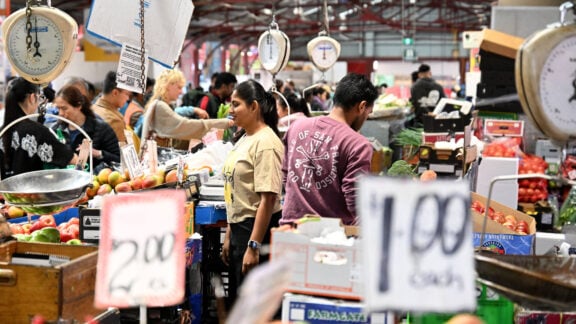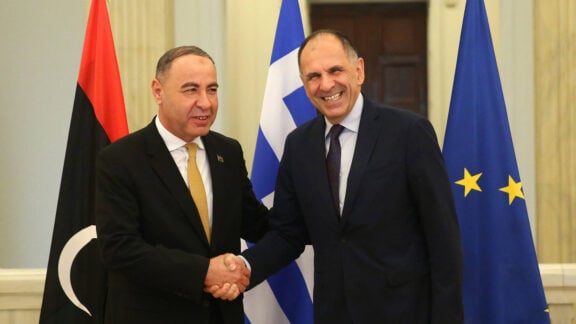The Athens Zen Center, in Monastiraki, is tucked away like a secret heart. From the street, the space looks an empty shell; it is only once you’ve crossed the threshold, once your eyes have adjusted to the gloom, that you see the poured-concrete steps that rise up to the next story. A small alcove of neatly lined-up shoes is tucked away next to a rice-paper screen door. Here, high above the winding, crowded streets, women from across Greece and the UK have gathered for a weekend-long conference of yoga, philosophy, and dance.
Stepping inside, I expect to encounter the serene stillness I associate with Zen. Instead, a little boy is tearing around, shooting a toy bow and arrow across a vast floor of padded mats. After a minute the receptionist, clearly his mother, comes out to quiet him, and welcomes me into the room. Behind another set of screens, a group of bodies are moving in unison, slow round shapes that stretch out to the shape of trees. There is a yoga session running a bit late, I am told; I don’t mind waiting.
I am here to meet Laura Shannon, who is about to lead a class in Greek ritual women’s dance. A dance therapist and folk dance specialist from America, she has a special interest in the Greek tradition, which she believes dates back, unbroken, to the Neolithic Era. Small clay figurines and bodies depicted on fragments of textiles form the same lines that we soon will; arms up, hands held, feet poised to symbolise the planting of seeds or the threshing of the harvest.
Laura teaches in a class with live musicians, two slightly bashful Greek men whose names I do not catch. She herself is fluent in Greek, except for where an accident has left holes in her memory. As the class assembles around a makeshift altar to Athena, the Greek goddess of wisdom, inspiration, justice and art, I wonder what I have signed myself up for, but Laura makes this spiritual aspect seem as commonplace and sensible – everyday, ordinary – as anything else we do in the 90-minute session.
She tells the story of each dance we learn in English and in Greek, often singing a traditional song to accompany the steps, and as the circle moves left and right I begin to feel the tensions of the week seep away. I haven’t realised until now how much I needed to hold another woman’s hand.
In the air, above Greece, my nose begins to bleed profusely. The flight attendant is worried and keeps offering me glasses of water, hoping that it is the altitude and not a potentially tragic haemorrhage. The woman sitting next to me offers me a packet of face-wipes, and laughs at me gently as I begin to try to swab the blood off the seat, concerned and embarrassed for the next person to sit in it. “Oh, you’re so kind,” she says. “Don’t worry, the airline has spares.”

After a day in Athens, my face and arms break out into a series of little pink lumps. The air is smoggy and humid, and leaves its marks on the sides of apartment buildings, where body corporates can no longer afford to power-wash grime away. The jetlag hits when I finally get to my apartment – I have kept it at bay through sheer force of will – and I sleep like the dead, ignoring the full sun on my face.
It is strange to wake without my husband and child. I am used to sleeping with a small foot slung across my stomach, or waking to a little hand gently stroking my hair. I have come to Athens to write about the festival, which is currently in full meltdown mode, and without an anchoring narrative arc I feel curiously weightless. The Greek coffee I make in the kitchen puts me back in my body. It is bitter and dusty on the teeth, coating my whole mouth and tongue.
I flip open Henry Miller, who I have bought at a second-hand bookstore, and read:
“Somehow, almost as if He were nodding, Greece still remains under the protection of the Creator. Men may go about their puny, ineffectual bedevilment, even in Greece, but God’s magic is still at work and, no matter what the race of man may do or try to do, Greece is still a sacred precinct – and my belief is that it will remain so until the end of time.”
Trust Miller, I think, trust Henry Miller to attribute this sense of sacrality and ancient ongoing lineage to a man.
The AthenaShakti Fest, at which Laura’s dance workshop is taking place, is the brainchild of yoga teacher Vivi Letsou. Thirteen years ago she returned to Greece from California, where she initially moved to study aeronautical engineering. Now she runs NYSY Academy, short for Νους Υγιής εν Σώματι Υγιεί – Healthy Body, Healthy Mind – while her husband oversees a vegetarian restaurant.
For 10 years or so the yoga and pilates community bloomed, with studios and annual conferences popping up all over Greece. Then the crisis hit.
“Now,” she says, “a lot of us are waiting to see how we can still continue to offer what we love, and still make a living in this country. For me, I’ve realised that we have to be about something else. And what I’ve been going through as a woman, in my early 50s, having health problems – what I felt was that we need to connect with a deeper force of life, of health, of creativity.”
Yoga in Greece has become a commercial field now, she says, dominated by male teachers.
“You go to a yoga class and there are like, 50 women, and the person teaching them is a guy. So that, and other things, made me inspired to do a yoga conference that is dedicated and inspired by the feminine intelligence, the feminine consciousness in life.
“That does not mean that it’s only for women, but it means that force of creativity, that spirit that gives birth, that gives life to everything. That’s how we perceive feminine consciousness. And we called it Athena because the Greek name for Athens is Athina, and it’s named after the goddess Athena.”
But, I say, the goddess Athena was also the goddess of war and strategy, wasn’t she? Though she only took up arms for causes she felt were just.
“Exactly. She was virtue, the goddess of justice, virtue, truth; the two main tenets are light and wisdom. She taught all the arts and the crafts, and she was also a warrior, and what does that tell us? Sometimes you have to draw the limit, and say ‘enough’.”
For Vivi, this means rejecting frustration and apathy as a response to the crisis and turning inward towards a more nourishing practice. Though she
adheres to Zen, in the conference she has organised discussions of femininity in broad religious, psychological, and spiritual contexts, with workshops across Christian, Buddhist, Yogic, and Ancient Greek traditions.
I ask how the crisis has affected the need of Greek women for these spaces, for workshops focused on femininity and strength.
“Well, it affected both men and women in that it’s dulled our senses, our sense of being and raison d’être,” she says. “But I think it did affect women in the sense that there is violence, more domestic violence at home. And it did affect women – look, there is our secretary, she has to work, she has to have her kid here, she has to go home in a few hours and cook and clean and do everything, and her husband is not doing it. They’re both working full-time, but she is taking care of the kid and taking care of the house. It makes an existing situation worse. But I am always hopeful that we can help create a sense of purpose, that we are doing something good, something really joyful.”
Having never been in Greece before I get lost easily. There is no apparent logic to the way the streets are laid out, the winding pathways of the city centre giving way to grids that are not parallel in relation to one another. I guide myself around mostly by phone, and when reception is bad, by searching for glimpses of the Parthenon, the ancient temple to Athena Parthenos, the goddess in her aspect of the virgin.
Gazing up at the slopes of the Acropolis is a relief; the streets are slightly claustrophobic. They are populated by old men drinking coffee, but also play out signs of the crisis in explicit, unmissable ways. Walking up Keramikou on the way to the market, I come across something I’ve never seen before, even living on the edge of Melbourne’s heroin corridor; a group of users cheerfully shooting up in the hot morning sun. They are basking in the light like a kindle of Athenian cats. One man is gesticulating with a fit that holds a bright jewel of blood, and I realise that my hands are opening and closing, involuntarily.
Later, coming home, I pass a Syrian woman sitting on the steps of a church, a tiny child splayed out sleeping in her lap. I have already walked a few steps along when I register the coffee cup of loose change at her side. Without knowing how to do it gracefully, I double back, and give her some of the apricots balanced at the top of my market bag. I am not thinking of her grave and quiet face, but of the mouse-bites my own son used to leave in any piece of fruit he found, when he himself was very, very small.
For the transit of particular bodies, Athens is the end of the line. That I am here voluntarily sets me apart. It is not that tourism is uncommon – it comprises 18 per cent of Greece’s GDP, now needed more than ever – but that the bulk of people occupying public spaces are either unable to leave Athens due to the devastation of austerity, or have been shunted here by extreme political force. Travel is always a luxury, but I am keenly aware that while Greeks may have once participated actively in the flow of bodies across Europe, this flow is now predominantly a one-way stream.
There are other reminders, too, of instability. The leftist district of Exarchia saw major rioting at the time of the crisis, prompted in part by police brutality, and riot police are now a permanent fixture on the street corners marking its outskirts. By all accounts, Exarchia has flourished on its own terms, becoming one of the few places refugees feel really safe, chasing out drug dealers with community action, and establishing time banks where people can exchange language lessons, legal information, even food.
Exarchia is where the market I visit takes place, a long Saturday stream of shoppers and wanderers. There is not a sense of anything out of the ordinary in this place, nothing to warrant the attention of police, except for its residents’ lack of fear when protesting the things they find unjust.
Inside the Zen Center, the air is cool and clean, a welcome change from Athens’ pervasive scent of oleander and cats. Laura stands in the circle, and the musicians begin to play, ancient folk songs that she and they are working to revive. Vivi and the other women who work at NYSY are dressed in white, which gives them the look of acolytes. We go around the circle and introduce ourselves. Helen is a yoga teacher. Tina runs a women’s circle here in Athens. Given that much of the advertising for this program has been in English, I expect many of the attendees to be tourists, but most of the names given are Greek.
For Laura, ritual dance has been a healing influence, both as a young woman and after a recent serious accident. After a Protestant childhood in which she always felt something missing, she became involved in folk and circle dancing, and then in women’s spirituality circles, which, she says, were trying to reinvent something involving ritual practice based on what was left over from ancient practices. None, though, talked about an ongoing, unbroken tradition, which is what she found living in Greece.
“It’s a living lineage from antiquity of women’s sacred embodied movement practice on behalf of the community,” she says, “generating blessings for the community, and it has in it everything that I wanted all my life.”
It was only after suffering a knee injury that she discovered women’s dancing as a form in and of itself.
“Women’s dances were a really neglected area in the folk dance scene, you know, and that reflects the world really; the male norm is the human norm, and women’s concerns are marginalised. When I had my knee injury, I could only dance the simplest, quietest dances, and I found that those were all women’s dances. And nobody was talking about them.”
In the space created by ritual women’s dancing she sees parallels to the feminist consciousness-raising of the second wave, and names the values that circle-dancing emphasises; cooperation and community, connection and mutual support, equality, sustainability and the conservation of resources.
The dances we learn are simple ones, but in the repetition of the steps, become almost hypnotically mesmerising. They are mostly of the sta tría, three-step, style, with hands linked and arms upraised, feet light. I think of my body, the tremendous forces of movement that brought it from home to here, and the glowing red expanse of horizon left behind as we flew towards the night. The woman to my right squeezes my hand, and through some unspoken arrangement, we do not let go of each other when the music stops.
Towards the end of the class the dance becomes more intimate, as elbows and hands are linked together for the ritual dance of Sta Tría Alátsata, a dance of mourning and grief which is almost a slow, communal shuffle; each woman takes and supports the next woman’s weight. The room is quiet as Laura sings, in Greek:
There’s no day that I wake
Without a sigh
Come, my sun, face me, speak to me
I return to my pillow
And cry my heart out
Come, let me see you, so I can be comforted
In Alatsata there is a mountain
Karadaï is its name
Come, dear soulmate, take my hand
Where the women of Alatsata go
To cry and sing their grief
Star of the dawn, why are you so late to appear?
Women cry unabashedly; I am amongst them. In amidst our private sorrows – homesickness and heartsickness, and loneliness and worry – is a sense of mourning for Greece itself, its beauty and its sadness, its culture and history forced into a shape that is too small to hold it. It is almost luxurious to cry like this, surrounded by other women, without a sense of embarrassment or shame. When the music stops we wipe our eyes and squeeze each others’ hands.
Afterwards I sit and chat with Laura, talking about her life and my life and her life’s work. Though Greece has held to these dances for thousands of years, the crisis has disrupted tradition by radically changing the practices and social composition of the villages.
“There’s no money in the village budget for the mayor to hire musicians to play for the panayiri,” she says, “even if it’s once a year, and people are leaving the villages to find work in cities or in other countries. The old people don’t have the same passion to dance if it’s not everybody all together, and people are suffering – they’re really suffering, and their hearts aren’t in it. And so people are forgetting the innate, unspoken order that used to go along with those rituals.”
It is why she is so committed to teaching, and why so much of her work is based around preserving the fragments of embodied history and culture she feels is dying out.
After I kiss her goodbye I walk out into the evening, which is just beginning to fade into dusk. It is hard, with the Parthenon floodlit above the city, to think of antiquity as something that is ephemeral and endangered, history as both fixed and ongoing. The streets are lined with both tourists and Greeks smoking and eating at small tables – even in times of crisis people still have to eat – and I wend my way around waiters carrying dishes of octopus, taramosalata, olives, wine. The completeness of my anonymity is comforting, and I hold it close. To Athina, I am just another body in the crowd.
* Jessica Friedmann is a Canberra-based writer and editor. Her new book of essays, ‘Things That Helped’ (Scribe), is out now. For more stories from Jessica, head to jessicafriedmann.com








